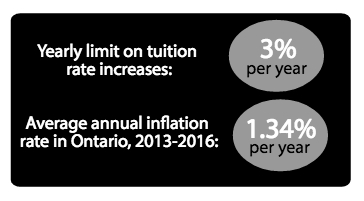The Ontario government has announced it will leave the existing tuition cap framework for universities in place for another two years.
The existing framework means schools can continue to raise Ontario tuition fees by as much as three per cent a year, a cap that has some student advocacy groups upset.
“It’s a framework that isn’t particularly good for students,” said Gayle McFadden, spokesperson for the Canadian Federation of Students (CFS)-Ontario.
“What we were calling for was a framework that calls for no increases.”
Ontario Ministry of Education spokesperson Sean Greson said the government will use the next two years to ease the switch to a new Ontario Student Assistance Program (OSAP).
“We decided to maintain the existing framework to provide stability to institutions and predictability to students while we focus on implementing the new OSAP,” he said via email.
Last year, the ministry announced the Ontario Student Grant (OSG), which will cover tuition for many students from low- and middle-income families.

The Ontario government has referred to the new OSG as “the largest reform of student assistance in the province’s history.”
But the cost of school has still been allowed to increase at a faster rate than in-flation, something student groups fought against in government consultations.
The average annual inflation rate in Ontario between 2013 and 2016 was 1.34 per cent, according to Inflation Calculator.
“Ideally at the maximum we’d like to see tuition capped at inflation,” said Colin Aitchison, steering committee member at the Ontario Undergraduate Student Association (OUSA).
“When we see tuition fees being allowed to increase by three per cent, of course insti-tutions that are starved for funding will take advantage of that,” McFadden said.
Carleton University vice president (finance and administration) Michel Piché said he’s satisfied with the framework extension.
“From our perspective, it’s a good thing to do because of all the uncertainty that’ll be created by all the other changes coming,” he said.
Both Piché and student leaders have said upcoming provincial changes to the education system are necessary.
Schools have been steadily losing funding from the government, to the point where Ontario colleges and universities are now deemed publicly assisted rather than publicly funded.
Universities are acquiring additional funding by hiking tuition, further putting the squeeze on students.
Piché said the province contributes around 40 per cent of Carleton’s funding, compared to about 60 per cent funding from tuition. When costs rise, the school must turn to students, he said.
“You have to continue to cover these higher costs. If the government is not going to be providing additional funding, then those costs have to be covered by tuition fee increases,” he said.
He added many schools are seeing declining enrolment numbers due to the higher tuition fees.
Any increases to tuition mean more money being doled out under the new OSG. The grant is expected to be funded with money from OSAP inefficiencies, but rising tuition could force the province’s taxpayers to chip in the difference.
With a provincial election coming in 2018 and Kathleen Wynne’s Liberals trailing the Progressive Conservatives in the polls, McFadden said student groups will be watching to make sure the government keeps its promises.
“We have a good opportunity to make this an election issue and make it a thing that’s being talked about,” she said. “They’ve been using terms like free education, and we can hold them to that in the election.”
But consultations with the government haven’t always gone smoothly, according to McFadden. In an interview in December, she said the CFS had consulted with the Ontario government on the framework and referred to the consultations as “garbage.”
McFadden said the consultations were “a few students” in a room “sharing their opinions and then not necessarily having those opinions reflected.”
Both McFadden and Aitchison said the extra time is a good step to refine the issues surrounding post-secondary tuition.
“[The framework] is far from ideal, but we think a short term extension will allow for better consultation with students and allow us to see how things like the new OSAP are working in practice,” Aitchison said
– File photo






